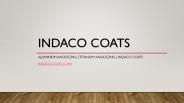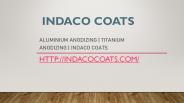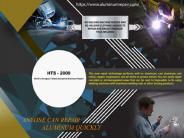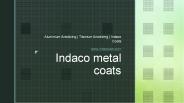Titanium Anodizing PowerPoint PPT Presentations
All Time
Recommended
Indaco coats provides best solution in aluminium and titanium anodizing electropolishing and surface finishing. Indaco coats for quality metal anodizing
| PowerPoint PPT presentation | free to download
Ladhani Metal Corporation is one of the stainless steel clamp manufacturers For more details: SS Clamp: http://bit.ly/3iGuBVS Titanium Tank:http://bit.ly/3XzKkF3 Titanium Butterfly Valve:http://bit.ly/3Xmc3c6 Titanium Ball Valve:http://bit.ly/3WfY0Uh Website: https://ladhanimetals.com Email: info@ladhanimetal.com
| PowerPoint PPT presentation | free to download
Ladhani Metal Corporation is one of the Stainless Steel Wire Mesh Manufacturers in India
| PowerPoint PPT presentation | free to download
Hard coating is process by which the surface of the metal is hardened. This process was invented inRussia for the surface of the space crafts. In this process, high intensity current is passed through the electrolytic solution. This forms a thick layer of oxide on the metal surface. This process turns metalsurface harder than steel.
| PowerPoint PPT presentation | free to download
Ladhani Metal Corporation is Manufacturer of ferrous and non-ferrous metal products.
| PowerPoint PPT presentation | free to download
Title: PowerPoint Presentation Last modified by: Created Date: 1/1/1601 12:00:00 AM Document presentation format: Other titles
| PowerPoint PPT presentation | free to download
Anodizing is an electrolytic process of coating the metal surface. In anodizing the surface of the metal is oxidized by electrolytic process, the layer that is created on the surface due to oxidation, protects the metal from corrosion. Not all the metals can be anodized, this is aluminium and some other metals like titanium, magnesium are anodized because of the chemical properties, they resemble.
| PowerPoint PPT presentation | free to download
Explore common questions about titanium wedding bands. Learn about durability, care, hypoallergenic properties, and more for this popular choice.
| PowerPoint PPT presentation | free to download
Anodizing is an electrochemical process by which the surface of the metal is oxidized. Anodizing helps, prevent the metal body from corrosion and overall it enhances the beauty. Almost all the metal gadgets that we have are anodized. The ships are anodized to prevent corrosion in marine water, we have anodized utensils, the medical equipment are anodized too. The majorly used metal in anodizing is aluminium, titanium is second most used material. There are other metals too, which can be anodized like magnesium, not all the substance can be anodized
| PowerPoint PPT presentation | free to download
Indaco coats is one of the best Metal coating company India in terms of quality. We are equipped with the most modern and qualified metal Coating system in India. we are the best in our aluminium and titanium anodizing and electropolishing in India. In Aluminium anodizing, we are leading company in clear (type2), Hard, and colour (type3). In Titanium anodizing, we are leading in Hard (type 2) and colour. we are very well equipped for electropolishing in India
| PowerPoint PPT presentation | free to download
contract to produce titanium strips. The criterion for competition ... Different voltages and anodizing times affect the thickness of oxide film on the titanium ...
| PowerPoint PPT presentation | free to view
Anodizing is an electrolytic process of oxidising the base of the metal base. By the process of anodizing the pace of oxidisation is increased. Anodizing can be done on various base metals, aluminium is the best metal for anodizing.
| PowerPoint PPT presentation | free to download
Anodizing is an environmentally safe electrochemical process that converts the aluminum metal surface into a porous aluminum oxide, ultimately creating an end product whose finish is more durable and weather-resistant. This beneficial result combined with the array of aesthetically pleasing color finishes opens up endless application possibilities for companies who anodize products and components in commercial, industrial, and consumer applications, even jewelry and artwork.
| PowerPoint PPT presentation | free to download
Anodizing is an electrolytic process where the surface of the metal oxidised. The oxide formed on the surface works as a shield to the inner metal and protects it from the outer environment.
| PowerPoint PPT presentation | free to download
Why Anodizing? Anodizing is perhaps the most commonly specified finish for aluminum machined parts. Advantages of Anodizing include: A very thin coating (.0002-.0012" for Type II) compared to paints and powder coat. Coating thickness can often be ignored for machined parts.
| PowerPoint PPT presentation | free to download
Iron Removal from Titanium Ore by Electrochemical Method Isao Obana1 and Toru H. Okabe2 1Graduate School of Engineering, The University of Tokyo
| PowerPoint PPT presentation | free to download
In Petroleum refining, acidic conditions arise from chloride salts entering the ... half as dense as iron & nickel based alloys. A pound of titanium goes a ...
| PowerPoint PPT presentation | free to download
The global titanium market size was significantly robust in 2021 and is expected to register a high CAGR over the forecast period. Increasing use of titanium in the chemicals industry for production of anodes and electrolytic cells and its adoption in the electronics sector pertaining to manufacturing of capacitors and resistors are major factors driving market revenue growth.
| PowerPoint PPT presentation | free to download
Anodizing is an electrolytic passivation process used to strengthen the products into an amazingly durable, versatile and superior building material. Anodize seal out moisture, inhibit corrosion and provide a controlled degree of coating build-up.
| PowerPoint PPT presentation | free to download
A pure Aluminium does not corrode easily. Aluminium has an oxide layer that is resistant to corrosion and wear. In aluminium alloys, the other metals, corrodes. To prevent this, a technique is invented. In this, the aluminium alloys are coated with the thick layer of the aluminium oxide. This oxide is resistant to corrosion and even make the metal stronger. This process is called as Anodizing
| PowerPoint PPT presentation | free to download
Download free PDF Sample: https://bit.ly/2xQnDFN #MetalAnodizing #MarketAnalysis This report focuses on the global Metal Anodizing status, future forecast, growth opportunity, key market and key players. The study objectives are to present the Metal Anodizing development.
| PowerPoint PPT presentation | free to download
when you’re in need of metal prototypes or parts with superior mechanical properties and specialized aesthetic design, anodizing aluminum is an excellent option. The anodizing process forms a layer of oxide on a metal part, effectively increasing corrosion resistance, and also enhancing visual qualities and keeping the surface from being scratched.
| PowerPoint PPT presentation | free to download
Anodizing is an electrochemical process, where the metal surface is coated with the oxide of the metal. in the process of anodizing the metal is dipped in a tank filled with electrolyte solution and electric current is passed through the solution. The metal in the tank act as anode. A cathode is placed in the solution.
| PowerPoint PPT presentation | free to download
Anodizing is a process, where the surface of the metal is coated with the oxidised metal. In the process, the metal is dipped into a tank filled with electrolyte solution and electric current is passed through the solution. The electric current causes the metal to oxide. The metal to be anodized, act as an anode and a cathode in the form of lead, is placed into the tank.
| PowerPoint PPT presentation | free to download
The Corrosion of Titanium and its Alloys at High Temperatures and ... Agitator blades. 3 Al 2.5 V 0.05 Pd. Ti-18. Nozzles, valves. 0.3 Mo 0.8 Ni. Ti-12 ...
| PowerPoint PPT presentation | free to view
If you are looking for electro-plating services in India, you can reach out to Indaco coats. It provides the best solution in aluminium and titanium anodizing electropolishing and surface finishing.
| PowerPoint PPT presentation | free to download
Evaluation of the Corrosive Effect of Adsorbed Proteins on Titanium and Steel Alloys Using the Scann
| PowerPoint PPT presentation | free to view
The fundamental utilization of titanium dioxide (TiO2) is as a white powder color in view of its shine and high refractive file. This implies generally low levels of the shade are required to accomplish a white dark covering. One of the real favorable circumstances for titanium dioxide is its protection from discolouration under bright (UV) light in uncovered applications.
Iron removal from titanium ore by electrochemical method 1 2
| PowerPoint PPT presentation | free to download
UHV and Surface Science Perspectives on ... Titanium Sublimation Pumps (TSPs) A clean layer of titanium is prepared, which reacts with atmospheric gases (even ...
| PowerPoint PPT presentation | free to download
PLATINUM PLATED TITANIUM ELECTRODES. Carla Cruz and Joshua Finch ... The lives of titanium electrodes used in industrial applications are limited due ...
| PowerPoint PPT presentation | free to view
Filamentary Tungsten Dispensers (also sometimes referred to as filamentary tubing or filamentary anode) are used for the manufacture of the final layer of anodized aluminum forging.
| PowerPoint PPT presentation | free to download
What are the four forms of surface modification? Name one way that oxygen plasma is used to modify the surface of materials. ... Titanium ...
| PowerPoint PPT presentation | free to view
... Jensen ON, Roepstorff P, Jorgensen TJ: Highly selective enrichment of phosphorylated peptides from peptide mixtures using titanium ... Affinity columns: ...
| PowerPoint PPT presentation | free to view
MMO titanium anodes, cathodes, HHO Generator, Fuel Cell Kits, Dry Cell Kit , H2O statuary engines, fuel benefits pollution free exhaust, Water4gas, fuel saver, wate car, Hydrogen and Oxygen, Green Gas, Brown's Gas, Rhodes Gas, Bubbler, Hydrogen Generator, Water reservoir, dryer, Increase the Mileage, electrolyzer, Automobile, Power Battery, Cooling Systems, Transportation, Diesel, Gasoline, biodiesel engine.
| PowerPoint PPT presentation | free to view
Aside from steel, titanium, and copper, metal CNC machining parts are getting to be famous nowadays. Our immense scope of hardware incorporates apparatus processors, sharpening machines, CNC machines, vertical factories, device setters, and a few others.
| PowerPoint PPT presentation | free to download
La fabrication des circuits imprim s. VI-5 Renforts lectrolytiques. 3 ... chauffage (60 C) - Redresseur (J 0,25 A/dm ) - Anodes : platinum plated titanium - air ...
| PowerPoint PPT presentation | free to view
The Flash lamp can do this the fastest since it has the most peak energy. ... Carbon migration can only be done on stainless steel and titanium. ...
| PowerPoint PPT presentation | free to view
The vision of the NYS P2I is to foster the transformation and development of ... TECT Utica. Manufactures titanium turbine blades for aircraft engines ...
| PowerPoint PPT presentation | free to view
Photocathode/Photoemission (basic) research (9 talks) Source system performance ... rep-rate synchro-Lasers (Titanium-sapphire) with 70 pikosecond pulse length ...
| PowerPoint PPT presentation | free to view
Calcined petroleum coke (CPC) is the product from calcining petroleum coke. This coke is the product of the coker unit in a crude oil refinery. The calcined petroleum coke is used to make anodes for the aluminium, steel and titanium smelting industry.Under the background of slower economy growth rate, companies face the higher risks of profit decline. Currently, calcined petroleum coke market has a certain potential in Europe, North America and Asia. These areas demand are relatively stable. During these years, China's calcined petroleum coke industry maintains a rapid growth.
| PowerPoint PPT presentation | free to download
CNC machining works great when you have a small quantity requirement or 100+ parts. Milling and Turning is widely used to machine engineering-grade plastic and metal parts to produce prototypes. CNC machining usually refers to high precision parts machining, CNC lathe machining, CNC milling multi-axis machining and so on. CNC machining works well for smaller quantities of up to 100+ parts process. We use milling and turning to machine engineering-grade plastic and metal parts for prototyping production commonly used production-grade metal materials, such as: Aluminum alloys, aluminum magnesium alloys, zinc alloys, titanium alloys, brass, stainless steel, Mild steel, Invar, copper and so on. We can match any color on your CNC machined parts according to your specification if you can provide us a color sample or Pantone color number. To know more visit: https://e-make.co/cnc-machining
| PowerPoint PPT presentation | free to download
Green petroleum coke has low sulphur content as compared to other types of coke. By grade type it can be segmented into anode grade which is used to obtain calcined coke which is used to manufacture anodes to produce aluminium or titanium dioxide, and metallurgical grade which is used as a reducing agent in iron and steel industry.
Toxic 'only' compatible with very few materials. Stainless steel, Titanium, EPDM, ... 2005. A.Fabich, CERN. 37. Proton beam on mercury Jet. BNL AGS. Proton beam ...
Anodising is an electrolytic process of oxidation of the metal surface. Basically, the surface of the corrosive material is coated with the non- corrosive material to prevent from rusting. These increases the durability of the metal and give it beautiful finishing.
| PowerPoint PPT presentation | free to download
Electroplating is a process that uses an electric current to reduce dissolved metal cations so that they form a thin coherent metal coating on an electrode. The term is also used for electrical oxidation of anions on to a solid substrate, as in the formation of silver chloride on silver wire to make silver/silver-chloride electrodes. Electroplating is primarily used to change the surface properties of an object (such as abrasion and wear resistance, corrosion protection, lubricity, aesthetic qualities), but may also be used to build up thickness on undersized parts or to form objects by electroforming.
| PowerPoint PPT presentation | free to download
Since the 1950s, scientists have commercially used the combination of electricity and chemicals to improve the surface finish of metals. It is a common finishing procedure across a wide variety of industries, including the following:
| PowerPoint PPT presentation | free to download
Lower strength. Good for extrusions. Popular in sports equipment. 6061 Aluminum Composition ... Tensile Strength. Untreated. T6. Property. Disadvantage of Aged ...
| PowerPoint PPT presentation | free to view
Electroplating is the process of coating one metal object by another, works by electrolysis, which is when electricity is used to drive chemical reaction So here we will be looking at three main aspects that is
| PowerPoint PPT presentation | free to download
Know the major causes of Aluminum Hole Repair. The fact is that we are affordable and built to last. It can be repaired by banging the damaged and can also cut and replace the damaged portion easily. Visit at-https://www.aluminumrepair.com/
| PowerPoint PPT presentation | free to download
Mechanics parallel session Critique Of ANTARES MECHANICS, S.CUNEO Analisys of mechanics ideas or NEMO, M.MUSUMECI R. OCCHIPINTI Composite material for deep sea water ...
| PowerPoint PPT presentation | free to download
Aluminum TIG rod is the old way to repair your aluminum spares, HTS-2000 is the advanced method. Braze the rods with a heat source and the parts are better than new, what else would you want? Visit www.aluminumrepair.com to order the repair kit online today.
| PowerPoint PPT presentation | free to download
HTS-2000 and HTS-528 are an excellent alternative to filler rod for welding. Easy to use, affordable repairs, fast in working, and strengthening the metal after brazing, innovative NTP aluminum repair kits are capable of all this. Visit www.aluminumrepair.com to know more or order a sample online here to know for yourself.
| PowerPoint PPT presentation | free to download
NTP has invented an innovative product that could strengthen the material by brazing aluminium to steel, HTS-528 brazing rods. All you need is a heat source and you can finish the work in minutes. Know more at www.aluminumrepair.com.
| PowerPoint PPT presentation | free to download
Electropolishing, also known as electrochemical polishing or electrolytic polishing (especially in the metallography field), is an electrochemical process that removes material from a metallic workpiece.
| PowerPoint PPT presentation | free to download
Want to learn how metal engraving is done? Here are the steps for metal engraving with a laser engraver. Visit: https://cnc604.ca
| PowerPoint PPT presentation | free to download
























































